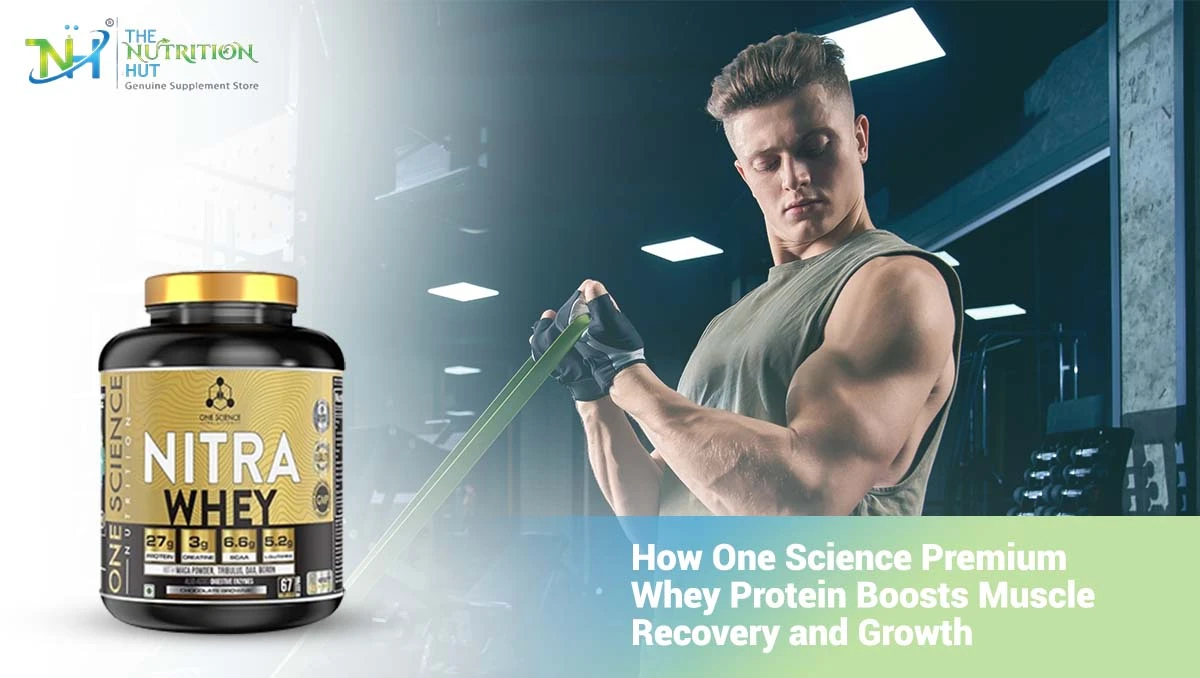How One Science Premium Whey Protein Boosts Muscle Recovery and Growth
A fit body can only be accomplished with adequate rest and recovery. Recovery is essential to a body as it rebuilds and recovers your body after an intense workout. During exercise, muscle breakdown and tissue tear can cause muscle soreness. So, a quick recovery aid for replenishing muscle tissue damage, replenishing energy, and reducing fatigue to improve enhanced performance and reduce injuries. One supplement that has gained a reputation for its role in post-workout recovery is whey protein. The One Science premium whey protein is the best protein for post-workout recovery and muscle growth.
What is Whey Protein?
Whey protein is a high-source protein found in milk. Another protein that is also found in milk is casein. These two protein sources are great for muscle recovery and muscle growth. Whey is a by-product of cheese production; the liquid released during cheese production is called whey. The whey protein is rich in all essential amino acids (EAA), including branch-chained amino acids (BCAA) like leucine, isoleucine, and valine, which provide muscle support. This protein source has a fast absorption rate, vital for muscle recovery, making it the best source available for post-workout recovery.
How Whey Protein Boosts Muscle Recovery and Growth?
Understanding how protein helps to recover muscle is the key to putting faith in this effective supplement you consume.
Whey protein helps facilitate muscle recovery by providing the essential building blocks your body needs. So, whey protein can significantly enhance muscle recovery compared to other protein sources. The science behind this is a high level of leucine, a branched chain of amino acids crucial in stimulating muscle protein synthesis.
Know how exactly does protein boosts muscle recovery and growth:
Quick Absorption
Whey protein is absorbed in the body immediately, starting the recovery process. This is why whey protein is preferred over casein protein, which is slow in absorption.
Amino Acid Profile
Whey proteins are rich in amino acids, containing all nine essential amino acids that the body cannot produce on its own. These amino acids are crucial for muscle growth and recovery. Leucine is the critical amino acid that triggers muscle repair because it contains the highest protein.
Supports Immune Function
Heavy workouts can temporarily suppress the immune system. However, the immunoglobin and glutamine in the whey protein can support immune health, ensuring muscle recovery and overall wellness.
Insulin Response
Whey protein boosts insulin production and plays a significant role in ingesting the amino acids in the muscle, which regulates the recovery process.
Reduce Soreness
Taking whey protein immediately after a workout helps reduce muscle soreness, known as Delayed-Onset Muscle Soreness (DOMS). By encouraging muscle fibre repair, the whey protein minimises the severity of DOMS and prepares the body for the next workout.
Support Muscle Growth
Adequate protein intake is mainly responsible for muscle growth. Due to its high leucine content, whey protein effectively stimulates muscle protein synthesis. Studies have found that good-quality whey protein can help increase muscle mass when combined with high-intensity workouts.
Its high biological value means it provides all the essential amino acids needed to support muscle repair and growth, making it a valuable addition to your post-workout routine.
Tips for Incorporating One Science Premium Whey Protein in Your Routine
You must stick to a proper schedule and dosage to get the best results from whey protein.
Timing
To see the best results, consume whey working within 30 minutes of your workout. This is when your muscles are most receptive and can utilize the protein effectively.
Dosage
The typical serving size of a protein scoop is 25-30 grams. However, the individual's protein requirements, body weight, and workout intensity determine the protein intake.
Hydration
Stay well hydrated. Whey protein requires adequate fluid intake. Drinking water or an electrolyte-rich liquid can complement the effects of whey protein.
Conclusion
Consuming whey protein offers multiple benefits, from accelerating muscle recovery and supporting muscle growth to enhancing overall performance and aiding weight management. With additional benefits like improved immune system and digestibility, whey protein empowers one to train harder and recover faster.
By incorporating one of the best protein supplements, One Science premium whey protein, into your post-exercise routine, you can optimize your performance and set yourself up for long-term success. Today, hundreds of whey proteins from various brands are available in the market, but determining which one is the best and identifying the original product has become a hectic task.
So, always buy your protein or other supplements from trusted providers.
The Nutrition Hut (TNH) offers high-quality whey protein supplements for muscle building at competitive rates. All products available with The Nutrition Hut are 100% genuine and safe.
Frequently Asked Questions (FAQs)
Q1: How much protein should I consume in a day?
A1: The recommended dosage is 20 to 30 grams of whey protein within 30 minutes of completing the workout. However, the total requirement for the body depends on your weight, exercise intensity, and fitness goal.
Q2: Is whey protein suitable for everyone?
A2: Yes, protein is safe, and anybody can consume it. However, lactose-intolerant people may experience a little discomfort in digestion.
Q3: Can protein help with muscle growth?
A3: Yes, protein is very useful in muscle growth. Bodybuilders and athletes use whey protein for muscle growth.
Q4: Which is the best whey protein for athletes?
A4: The One Science premium whey protein is popular among athletes and fitness enthusiasts. It is available at a discounted price at The Nutrition Hut.
Q5: What are the three types of whey protein?
A5: The three primary types of whey are whey protein concentrate, whey protein isolate, and whey protein hydrolysate.



Related Blog
How Protein Supplements Can Boost Your Workout Performance
Dec 18, 2024 by Admin
Protein